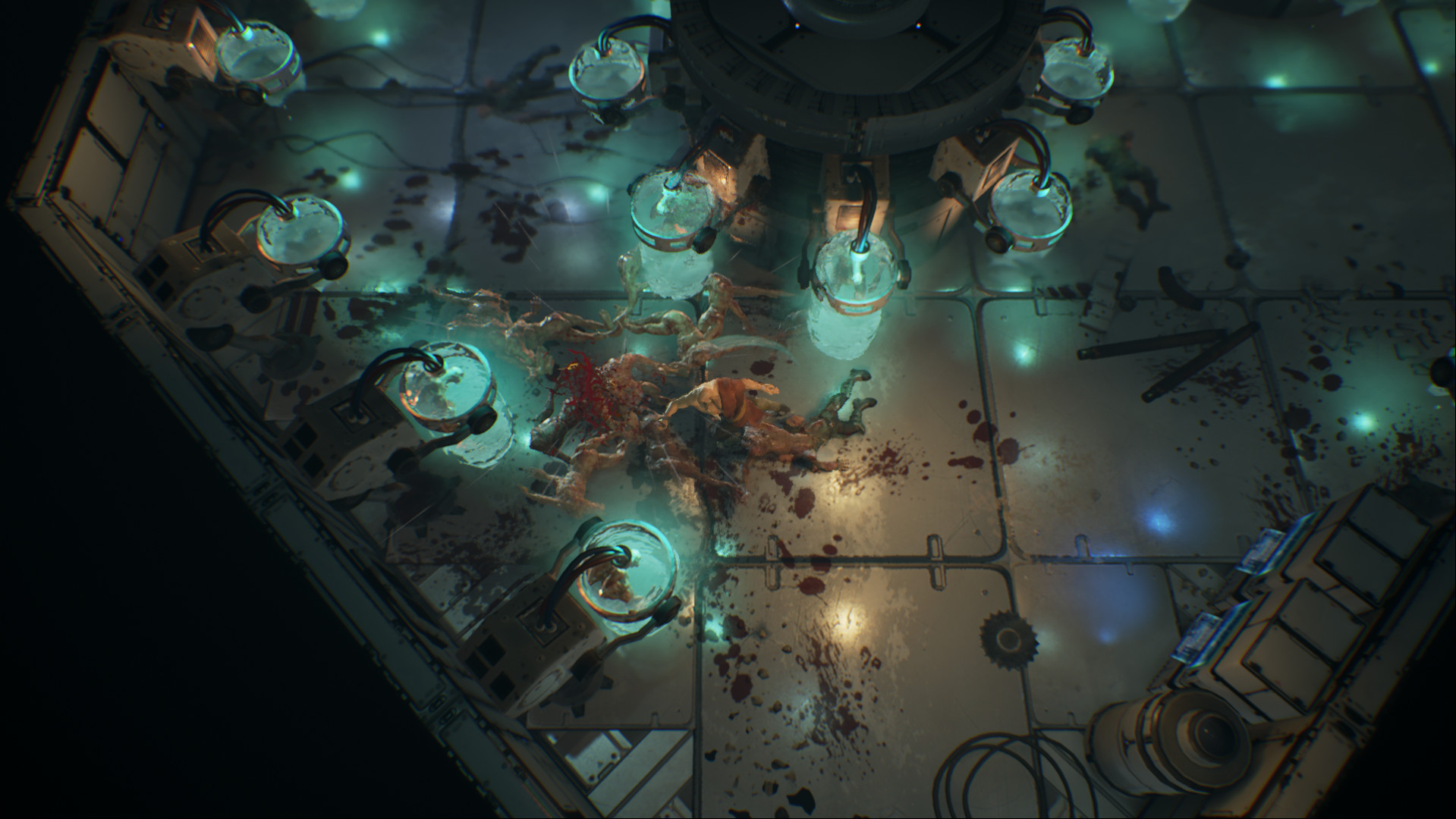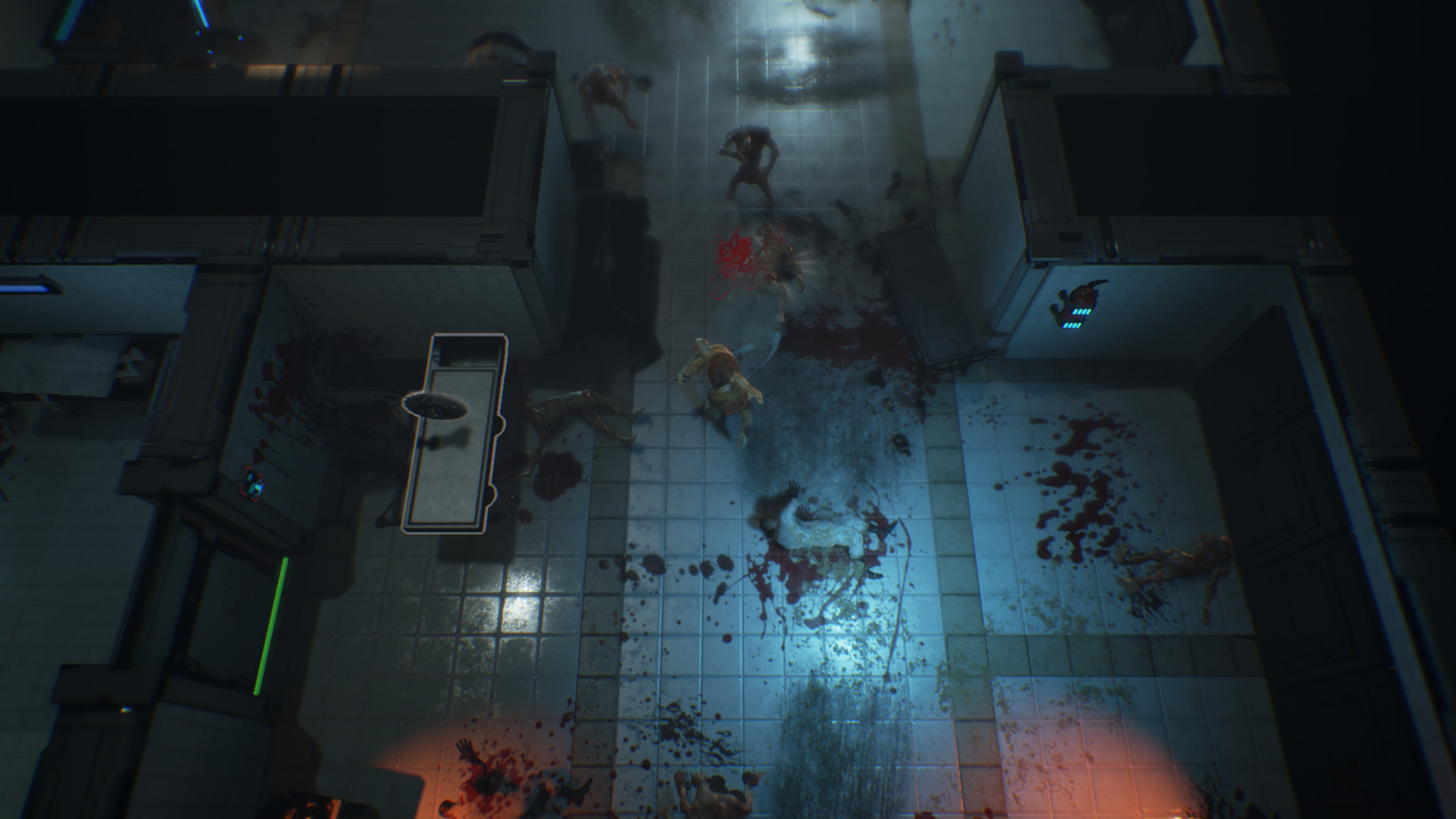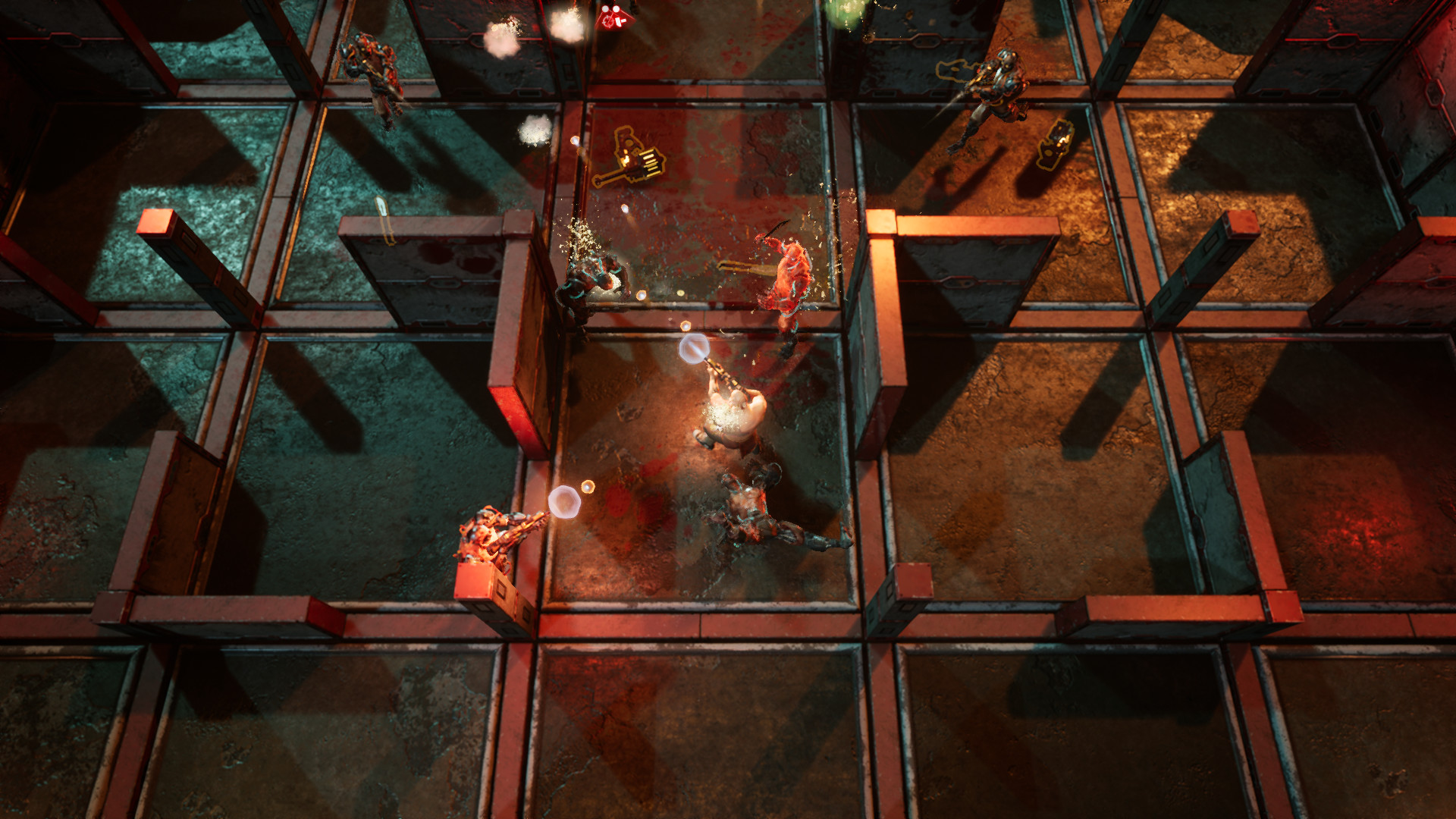On August 1, the release of the domestic Redeemer browser from Sobaka Studio took place. How long the game was developed and how the team chose the publisher, – App2Top.ru I asked the head of the studio Dmitry Kachkov.
Redeemer is one of the most striking Russian releases of this summer, before the release it was awarded as part of the White Nights Indie Game Cup, DevGAMM Awards and GTP Indie Cup. The expensive-looking and fascinating project was developed by a team of five people distributed between Moscow and Kaliningrad. The publisher of the project was the Amsterdam Gambitious.
Alexander Semenov, Senior Editor App2Top.ru : The history of development began almost in school time. School – how many years ago is it?

Dmitry Kachkov
Dmitry Kachkov, Head of Sobaka Studio: The development had several stages.
The very first stage, the earliest, was when we were completely green playing games, and the passion for projects in the spirit of Battletoads was “sewn up” on the subcortex.
The second stage was a little later. Around the 11th grade, when each of us was choosing what to do next.
Everything was going to programming for me. I studied it and mathematics, participated in Olympiads. Misha Bushuev, who now lives in Kaliningrad, was an artist by vocation. And we had something like a small indie team – only very young.
After graduating from school, it began to turn out to do something more or less like a game. We tried with grief in half to screw the animation, the levels, the plot was written on a piece of paper.

But was it already Redeemer?
Dmitry: Yes, but in the beginning the game was called Escape. The game was built around the idea that someone–the one who later grew into Vasily–would escape from prison. It was a fixed idea: the game will start with the fact that you will escape from prison.
Then there were crazy ideas about the capture of aliens, about how Vasily became the ruler of the world.
Then the artist, Misha, joined the army. There was such a story that just at that time it was very popular to “mow”. Now, probably, they are also “mowing”, but then it was just very, very much. And he says, “I won’t mow, I’d rather take a year off.” And without an artist somehow there is no inspiration, nothing.
I continued my studies and then, at the end of the fourth or beginning of the fifth year, I went to the CREE. I met the guys from Creat Studios.
They offered to send their resume. That’s how I ended up in St. Petersburg. I didn’t know how to do anything, but they took me as a beginner. I was delighted, came back, passed the session and left for St. Petersburg with the ends for the position of a programmer. And Escape completely disappeared from the horizon for five years.
At Creat Studios, I did a couple of projects in a row, rose to lead programmer, and then moved to Sperasoft, where we did an internal project.
The transition to a new team was a key stage, because at Sperasoft my colleague Alexander Shafranov taught me Unreal Engine.
At Creat, we worked on our own engine, which by today’s standards, of course, is very inferior to the market leaders. But then there was no Unity, and Unreal Engine was not available. I had to make the engine myself, which is very difficult.
Then the Sperasoft project “bent over”, it was frozen, and I went to Moscow, to Glu Mobile, immediately as a leading programmer on Unity.
Suddenly.
Dmitry: Yes. I came to Moscow in Glu Mobile on Unity.
Having started working on mobile phones in Glu Mobile as a leading programmer, after about a couple of months I began to feel some kind of blandness in my work. Mobile phones, Unity is a bit boring.
Yes, we were engaged in quite interesting and powerful projects, there were enough challenges, but not the level that work on a game about Vasily could offer.
And something inside caught fire. I felt the opportunity to take and do something of my own.
I felt it and started digging. I started digging at night on UDK (Unreal Development Kit, free version of Unreal Engine 3, – approx. editorial offices).
When was that?
Dmitry: I got a job at Glu Mobile in the middle of 2012. I came to Glu Mobile and the phase of work on my own project, on Redeemer, began.
For about three and a half years, we worked on the project at night.
Over the years of working at Creat, at Sperasoft, at Glu Mobile in Moscow, I have met a lot of people. I am an open, positive, sincere person, so somehow people…
Stretched.
Dmitry: Yes. And we managed to connect people to the development who could devote their free time to the game.
Working in this format, we collected a demo in three and a half years, which we then published in Greenlight.
Which one is on UDK?
Dmitry: No, what we posted in the end was already done on UE4.
Two and a half years after we started working on Redeemer, we switched from UDK to Unreal Engine 4.
We switched right away as soon as Unreal Engine 4 came out. The transition took a month.
Was there no temptation to stay on UDK?
Dmitry: There was an internal struggle.
On the one hand, it was clear: UE4 is a bomb engine.
On the other hand, I was completely unfamiliar with him, and he is very different.
It was clear that only the transfer of the game to another engine could take a month.

But I’m a pretty chaotic person. I don’t think through what it’s worth, I don’t sort out the possible consequences on the pros and cons. If I feel like I have to do this, I do it! That’s what happened here.
Just an inner realization came that there is no way without translation to UE4. Yes, you can sit on UDK, but it is unlikely that you will be able to finish a full-fledged game on it. We will not be able to grow and progress on it.
Therefore, taking the will into my fist, I transferred the game to UE4.
You said that there were a lot of people who helped you. Was there any plan when you seriously started developing it?
Dmitry: No, no plans! (Laughs).
We never had a goal, let’s say, “so, guys, we’ll do it in a year now.”
I’ve seen teams with this approach end badly. If someone falls out of it or offers a new idea, the process will immediately disintegrate and you will be left with a broken trough.
To control the execution of the plan, you either have to have financial influence on people, or be some kind of charismatic with a group of vassals who carry out your orders.
Neither the first nor the second is our case. We developed the project in our free time on a voluntary basis, and everyone could throw in ideas, no one limited anyone in proposals.
In such a case, of course, it is necessary to guide somehow, but it is not necessary to clamp the nuts. You just have to go with the flow.
Alexander Semenov: There was no plan at the whole stage of development?
Dmitry: That was until we contacted the publisher.
Before signing the contract with the publisher, we set local goals – for example, in a month we will collect a video that we will show. But no more than that.
Of course, when we drew up a table of plans already with money, with a budget, it is obvious that crunches and everything else appeared here.
You made a demo a year and a half ago, do I understand correctly?
Dmitry: It was at the end of January 2016.
Have you posted and purposefully started searching for a publisher?
Dmitry: Not quite. Before the release of the demo, we sent different iterations of it to different publishers over the course of a year.
A conversation was started with some of the publishers, they were interested and asked how much it cost. And someone even tried to find some money for us. But all publishers were very scared that we, roughly speaking, “from the hill”, we have our first project, we just got together and we have an ambitious game.
An ambitious project is not $10 thousand, it is more expensive.
What were your specific requirements for publishers? Or rather, did the publishers have requirements for you?
Dmitry: We had and still have two specific requirements that we have never changed and have always talked about them.
First, we are working on Unreal Engine, this is not discussed.
Secondly, we do not agree to work at half price.
There were publishers who said, “you understand that if the budget is made up of your usual salaries, then you will not lose anything and you will work poorly, you will not be motivated.”
We were offered to work for future royalties. They say, if you release the game, there will be royalties, they will become the salary. They will even be more than the salary if you make a good game.
I’m not saying that this approach is something bad, wrong. But knowing my team, knowing their experience, their expertise, I did not agree. These people can’t work for half the price.
We were not ready to agree to the conditions where we would work for a future noble goal, and now we have worked hard. Everyone has at least 5 years of experience in the industry, part of the team has at least 8 years, all experts.
Plus, I had to pick up people from work.
And so they, conditionally, receive 100 thousand. I tell them: “Let’s make a cool game, it will be a bomb, and I will pay you 50 thousand each.” I can’t imagine that, no matter what royalties I promised them.
Therefore, we wrote off and talked for a year. I went to meetings, I met people.
But when we posted the game in Greenlight, everyone found us right away, instantly. Both Western publishers began to write, and our publishers became more active in negotiations.
Even when we were about to sign with Gambitious, our current publisher, we had a choice. There was another publisher who was willing to pay lip service to our terms, there was even an agreement of intent. But we decided to enter the market with a Western partner.

The whole joke with Gambitious is that from the moment they wrote to me, only one week passed before the conclusion of the contract.
By the way, after that we went to conferences in the West, and I think I felt that people there have a slightly different attitude to business. It’s not serious for them when you are both determined to work, and doubt, look with a squint and think how to make sure that they don’t fool me.
In Russia, I felt this all the time. I talk and see that they look incredulous!
In the West, people don’t ask such questions, as if I can run away somewhere in the forest.
Can you announce a general budget for at least the last, final year?
Dmitry: The budget is measured in hundreds of thousands of dollars. I won’t say more specifically, the trick there is that there is a development budget, there is a marketing budget, there is testing and localization.
If we talk about the development budget of the last year, when we were already working on the game full day, then we can estimate a very approximate estimate of $ 200-300 thousand. We have about one million a month spent on office, salaries, taxes, outsourcing and so on. Definitely not more than $500 thousand.
Are you satisfied with the cooperation with Gambitious as a result?
Dmitry: Yes. If you want to know, then Gambitious – I recommend it! (Laughs). They are very developer- and user-oriented. And they are very friendly. It is important.
You have released a project. Is the Gestalt closed, roughly speaking? The one from childhood?
Dmitry: We have finished the project. It was a project that we did for a long time, we went to it for a long time. We made it. We are very proud. And we believe that we have done a colossal technical job. There are some flaws, but we are very happy. And now we are working on a new project.
Are you satisfied with the pace of sales? Are you, the team, the publisher?
Dmitry: There are many factors there. The first is absolute, zero predictability. In general, it is unclear how much the game will earn! It’s a shame that we have 65% drawn on Metacritic. We collected all the reviews from the Internet – there are more than 60 of them – and averaged them ourselves. All numeric found: Russian, Brazilian, Italian. There are even three nines. Everything was averaged, it turned out to be 7.1, but 65% was written on Metacritic. Of course, I am sure that these 65% are in our way.
Usually, when the game is on the market longer, it is evaluated by 20-30 critics. So we hope that a later version of the game (with patches and fixes) will be criticized by more press, and the score will improve. I think the assessment can influence this case. Although we have 85% positive reviews on Steam.
Today I read a comment, a person writes that the game is “one big, very long orgasm.” It’s really cool to get these comments.
Will there be updates?
Dmitry: We patch the game every day.
As for sales, they are, as I said, very unpredictable. For the first couple of days, they were low.
But then Steam gave us a feature. A large “Recommended” banner. Our sales have “exploded”! We were on the 22nd place in the global sales list on Steam (at the time of publication of the material, the game dropped significantly in the top, – approx. editorial offices).
We are now hoping for streams and reviews of big video bloggers.
Steering towards the end, a difficult question. Very often it is heard from hardcore players that there are no good domestic games within the hardcore niche. Among developers, you can also hear that there are no professionals to make them in Russia. I’ve heard it myself more than once. And so you come out and literally debunk both positions, because you have a high-level hardcore project. Where do you think these beliefs came from and why did you succeed and the rest did not?
Dmitry: We succeeded because we purposefully moved in this direction. We wanted to make such a game.
In addition, there are many other factors that have played an important role in this. The first of them is the team that we managed to assemble, which consists of like–minded people. The second is the experience of everyone in the team. The third is Unreal Engine, without it we wouldn’t be a mile where we are now.
I am an expert on Unity, I worked as a leading programmer, traveled to Unite, I know deeply all its features. But Unreal Engine is unreal, as it is called, so it is.
Of course, we were very lucky with the publisher. In general, the stars came together.
Why don’t they do it in principle?
I suspect what this is related to. It’s very sad, but in Russia, publishers who have money are not interested in making such games, despite the fact that they often “shoot”.
They are interested in something else.

Here is a graph they will draw in a notebook: “Look, we will make sales.” And the graph goes from bottom to top.
And people throw money there, because everything is drawn in tables and graphs. They throw on mobile projects, they throw a lot on VR now.
It seems to me that this is similar to the situation with Russian cinema. Bad Comedian showed how the Cinema Foundation approves applications. There’s a big screen, some graphics on it, some person explains why a movie about bloggers will be very popular. And he makes arguments.
And money is allocated for this. It’s hard to say whether there is no taste, or they are just being conducted, or they are drinking beer together in a cafe, I don’t know.
And games like ours, like movies, are art, creativity, you can’t draw graphics based on them.
At the end of the interview, I really want to say hello to my family. While working on Redeemer, I had two children, and, of course, Redeemer dragged a lot of attention to himself. But I always believed that investing in it would be very useful, and self-realization is always on the agenda anyway. I want to apologize to my family for being too stuck in work and thank them for their support in difficult moments.



